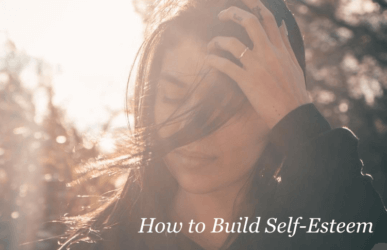Self-esteem is the perception you have of yourself. When your self-esteem is low, it affects every aspect of your life, especially your relationship with the people around you. If you feel you are not good enough, you must work on your esteem, but first, you need to find out the cause of your low self-esteem.
Why Do People Have Low Self-Esteem?
If you find yourself feeling low about yourself, don’t worry, it is in no way your fault.
The factors that cause low self-esteem works for different people in different ways; it could be past experiences and trauma, background, the people you surround yourself with, and life circumstances.
Although you cannot change the past, you can determine who you want to be going forward. Before we talk about solutions, you have to identify the cause, here are four primary reasons why people develop low self-esteem:
1. Past Experiences.
No matter how we try to deny it, what has happened in the past directly affects how we feel about ourselves. These past experiences could be:
- Trauma. This could be past physical, mental, emotional, or sexual abuse; victims of these forms of abuse tend to lose esteem. These memories make them feel ashamed of themselves.
- Bad Parenting. The way we were brought up has a direct effect on our esteem. Children from parents who belittle them, compare them with their peers and mock their efforts stand a chance of losing their esteem. Parenting is responsible for building or destroying our esteem.
- Bullying. Bullying is a big problem in our society, especially among children. Bullying directly affects our confidence; it affects the way we think about our physical appearance, athletic and physical abilities, and every other aspect of our lives. Adults are also victims; when you are humiliated in your workplace, in a social gathering, or among your peers, it can bruise your esteem directly.
- Discrimination. If you are discriminated against based on your gender, race, and sexual orientation, it makes you start doubting your abilities. Studies show that women are socialized to worry about what people think of them. As a result, they are more conscious of the decisions they make. When you are constantly discriminated against based on race, and sexual orientation, it also affects how you think about yourself.
2. Movies, social media, and adverts on TV.
Movies, social media, and adverts on TV are designed to make us lose our confidence (this might not be a deliberate act, but sadly we have been dealing with it for a long time). Most advertisements, especially for beauty products, start by showing “the problem” then offer an unrealistic solution depicted with models.
Movies are also culprits; they depict a society where every protagonist is a fabulous supermodel with superficial abilities. Knowing you don’t have these features can make you feel less of yourself.
“One reason we struggle with insecurity: We’re comparing our behind-the-scenes to everyone else’s highlight reel.”
—Steven Furtick
3. Anxiety and Depression.
People who are victims of anxiety and depression tend to fall short of their confidence. Research shows that most people diagnosed with an anxiety disorder or depression then feel low about their abilities. Depression and self-esteem go hand-in-hand; if you build your confidence, it will directly reduce your anxiety and depression.
4. Unrealistic Goals.
Sometimes we set goals that are beyond us. It is not always our fault because when we find ourselves in a society that is only concerned about what we can achieve, a society where people are associated with our success puts us on edge. When we find ourselves not achieving these unrealistic goals, we start to look down on our ability.
How to Build Self-Esteem
Now that we have identified the major causes of reduced self-esteem, the next step is to learn how to improve our esteem. Remember, our esteem is how we place ourselves and how we perceive ourselves and our abilities.
1. Find and Acknowledge the Problem.
It would be difficult trying to build back your self-esteem if you don’t know the cause. So you need first to find out the problem, then challenge it.
The best way to go about this is to notice what you think about yourself; for instance, you might find yourself thinking, “I am not beautiful enough” or “I can’t make it”. You can counter these thoughts by telling yourself that they are not true. If you feel that you can’t make it, constantly remind yourself that you can do anything. If you feel you are not beautiful enough, tell yourself that you are unique, this will help boost your confidence and turn your esteem.
2. Identify Your Strength.
If you don’t know your strengths, you will not know what you are capable of; start by writing positive things about yourself, such as being a good singer or all the good things people have previously said about you. Then, any time you feel inadequate or incapable, look back at your strength and tell yourself that there is plenty of good about you no matter what happens.
Over time, it has been proven that what you tell yourself constantly is an excellent way to improve your self-esteem.
Rather than being negative, be more positive with what you tell yourself; you will be more confident by viewing yourself more positively.
It is normal to catch yourself falling back to negativity, don’t beat yourself; it takes time and regular effort to grow into a more positive person and build your self-esteem.
3. Associate With Only Positive People.
Take a moment and reflect on your relationship with people; you will notice that some people and certain relationships place you in a better place (emotionally and mentally) than others.
Maintain a closer relationship with people who make you feel good about yourself; these people will help you build your self-esteem. At the same time, disassociate yourself from people or relationships that make you feel negative; they will only drag you down.
4. Take It Easy on Yourself.
Remember that you are not perfect; nobody is; you cannot feel good about yourself every hour of every day. Nobody does.
Having good self-esteem varies based on the situation; even the most confident people have moments of weakness. Some people are more confident when they are around family and friends but tensed when they meet a new face or in an official setting; others are more confident socially yet incapable of taking command of themselves.
This is normal; besides, we are humans. So don’t be too hard on yourself; we all have those moments when we feel a little bit down and lose our esteem in the process. Always remember that it is just and moment, and you will get back on your feet in no time, so don’t be hard on yourself, and don’t be too critical.
When you feel down, avoid criticizing yourself to others because you may start believing what you tell people about yourself, and it will also give them a negative view of you. In such moments, you can boat your self-esteem by congratulating yourself for giving yourself a treat when you overcome a task or manage a bad day.
5. Be Assertive and Learn to Say No.
People with low self-esteem take almost anything thrown at them, so they find it hard to say no or stand up for themselves. Low self-esteem will leave you over-tasked both at work or home because of your inability to say no to people. When you get overburdened, it increases stress and leaves you worse than you already are.
This makes it essential that you learn how to say no, especially to things you clearly can’t handle. Also, learn to be more assertive; assertiveness will help improve your self-esteem. Believing in yourself is a step to boosting your esteem.
6. Improve Your Physical Health.
When you are healthy and your body is in good shape, it will be easier to feel good about yourself. Low self-esteem starts with not feeling attractive enough, feeling ugly, or not good enough to look at. That’s why it is common to find skinny people with low self-esteem.
Start by exercising, getting more sleep, and improving your diet. These activities have proven to be good at making people feel better. Don’t be caught up in the circle of society; take out time to do things that you’ve always wanted to do, rather than what you are expected to do. You’ll be surprised that these little things will play a significant role in improving how you feel about yourself.
7. Take on Challenges.
It is not uncommon to see people with low self-esteem running away from challenging and difficult situations because they are scared to fail.
One way to boost your self-esteem is to take the bull by the horn and face these challenges.
This does mean you should set unrealistic goals or take on tasks that are beyond you. Set your goals, take on achievable challenges, and remember to take things a step at a time. For every step you overcome, you start to believe that you can achieve.
Final thoughts
Don’t expect to see your self-esteem jump from low to high in days. It takes time, so take things a step at a time and have your eyes on the bigger picture. When you make progress commend yourself, and if you relapse, don’t worry; you are human, so keep trying.
Phone Line Categories








